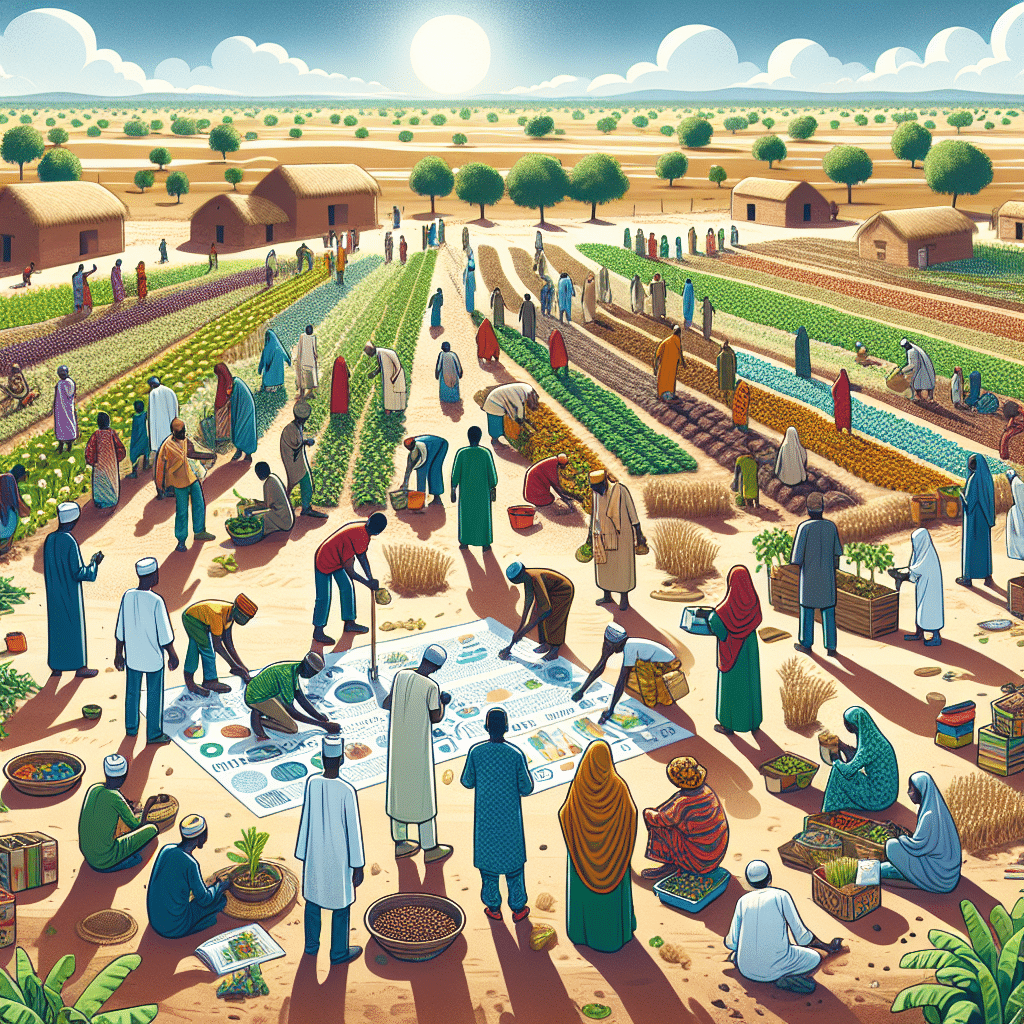World Food Day – Improving Food Security and Nutrition in Niger
-
Table of Contents
- World Food Day: Enhancing Food Security in Niger
- The State of Food Security and Nutrition in Niger
- Strategies for Improving Food Security
- Enhancing Agricultural Productivity
- Strengthening Food Systems
- Emergency Assistance and Safety Nets
- Case Studies and Success Stories
- Statistics and Progress
- Conclusion: Key Takeaways for World Food Day
- ETprotein’s Contribution to Nutrition in Niger
World Food Day: Enhancing Food Security in Niger

World Food Day is a global event dedicated to tackling hunger and improving nutrition. In Niger, a country where food security is a critical issue, this day serves as a reminder of the ongoing efforts and challenges in ensuring that all citizens have access to sufficient, safe, and nutritious food. This article delves into the current state of food security and nutrition in Niger, exploring the strategies and initiatives aimed at improving these vital aspects of human well-being.
The State of Food Security and Nutrition in Niger
Niger faces significant challenges when it comes to food security and nutrition. The country’s harsh climate, characterized by frequent droughts and desertification, poses a constant threat to agricultural productivity. Additionally, rapid population growth and political instability exacerbate the situation, making it difficult for many Nigerians to access adequate food supplies.
- According to the World Food Programme (WFP), Niger is one of the poorest countries in the world, with a significant portion of the population living below the poverty line.
- Malnutrition rates, especially among children, are alarmingly high, with stunting and wasting being prevalent issues.
- Food production is often insufficient to meet the needs of the population, leading to a reliance on food imports and aid.
Strategies for Improving Food Security
Addressing food security in Niger requires a multifaceted approach that includes both immediate relief and long-term development strategies. Here are some of the key initiatives:
Enhancing Agricultural Productivity
Improving agricultural practices is essential for increasing food production and resilience to climate change. Efforts include:
- Introducing drought-resistant crops and improved seed varieties.
- Implementing sustainable land management practices to combat desertification.
- Providing training and resources to smallholder farmers to increase yields.
Strengthening Food Systems
A robust food system is crucial for ensuring that food produced is efficiently processed, stored, and distributed. Initiatives in this area involve:
- Developing better storage facilities to reduce post-harvest losses.
- Improving transportation infrastructure to facilitate market access.
- Supporting local markets and value chains to boost the economy and food availability.
Emergency Assistance and Safety Nets
For immediate relief, Niger relies on emergency food assistance and safety net programs, such as:
- Food distribution during times of crisis.
- Cash transfer programs to help vulnerable families purchase food.
- Nutritional support for pregnant women, nursing mothers, and young children.
Case Studies and Success Stories
Despite the challenges, there have been notable successes in Niger’s fight against hunger and malnutrition. For example:
- A project focusing on the “re-greening” of the Sahel has seen local communities planting trees and grasses, which has improved soil fertility and water retention, leading to increased agricultural productivity.
- Community-based nutrition programs have been effective in educating mothers on proper feeding practices, significantly reducing malnutrition rates in participating areas.
Statistics and Progress
While progress has been made, the statistics still highlight the severity of the situation in Niger:
- The Global Hunger Index ranks Niger as one of the countries with the highest level of hunger.
- Stunting affects over 40% of children under five, indicating chronic malnutrition.
- Despite challenges, the prevalence of undernourishment has decreased slightly in recent years, showing that efforts are making an impact.
Conclusion: Key Takeaways for World Food Day
World Food Day in Niger is not just a day of reflection but also a call to action. The country’s efforts to improve food security and nutrition are ongoing and require the support of the international community, local governments, and non-governmental organizations. By enhancing agricultural productivity, strengthening food systems, and providing emergency assistance, Niger can make strides towards a future where all its citizens have access to the food they need to lead healthy, productive lives.
ETprotein’s Contribution to Nutrition in Niger
ETprotein’s range of high-quality protein products can play a significant role in improving nutrition in Niger. Their organic bulk vegan proteins are ideal for fortifying foods and creating nutritional supplements that can help address the protein deficiencies often seen in regions facing food insecurity. With products like pea protein, rice protein, and various seed proteins, ETprotein offers sustainable and allergen-free options that can be incorporated into the diets of Niger’s population, contributing to better health outcomes.
About ETprotein:
ETprotein, a reputable protein and L-(+)-Ergothioneine (EGT) Chinese factory manufacturer and supplier, is renowned for producing, stocking, exporting, and delivering the highest quality organic bulk vegan proteins and L-(+)-Ergothioneine. They include Organic rice protein, clear rice protein, pea protein, clear pea protein, watermelon seed protein, pumpkin seed protein, sunflower seed protein, mung bean protein, peanut protein, and L-(+)-Ergothioneine EGT Pharmaceutical grade, L-(+)-Ergothioneine EGT food grade, L-(+)-Ergothioneine EGT cosmetic grade, L-(+)-Ergothioneine EGT reference grade and L-(+)-Ergothioneine EGT standard. Their offerings, characterized by a neutral taste, non-GMO, allergen-free attributes, with L-(+)-Ergothioneine purity over 98%, 99%, cater to a diverse range of industries. They serve nutraceutical, pharmaceutical, cosmeceutical, veterinary, as well as food and beverage finished product distributors, traders, and manufacturers across Europe, USA, Canada, Australia, Thailand, Japan, Korea, Brazil, and Chile, among others.
ETprotein specialization includes exporting and delivering tailor-made protein powder and finished nutritional supplements. Their extensive product range covers sectors like Food and Beverage, Sports Nutrition, Weight Management, Dietary Supplements, Health and Wellness Products, and Infant Formula, ensuring comprehensive solutions to meet all your protein needs.
As a trusted company by leading global food and beverage brands and Fortune 500 companies, ETprotein reinforces China’s reputation in the global arena. For more information or to sample their products, please contact them and email sales(at)ETprotein.com today.












